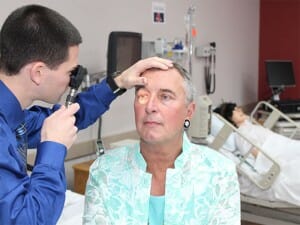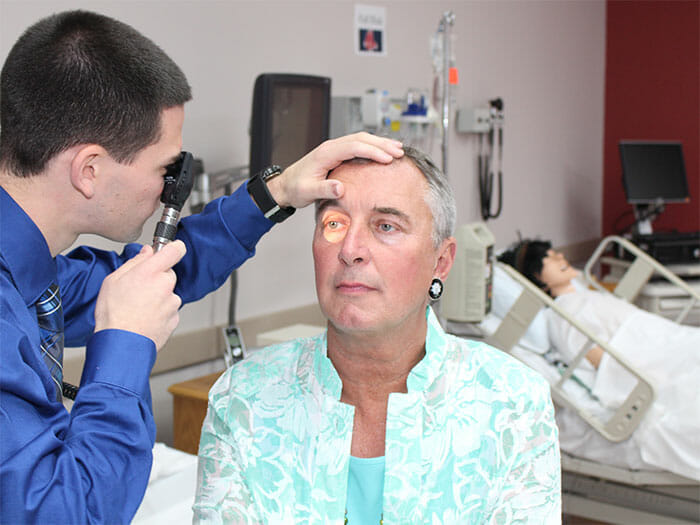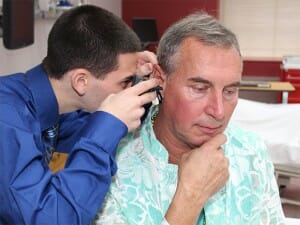
Andrew Capizzo, currently working toward his MS in Adult Gerontology, performed the role of a Nursing student working with Standardized Patient Joe Daly, a local actor, who is portraying a transgender individual transitioning from male to female.
The ability of a clinician to develop a rapport with a patient, the skill to perform an organized physical examination, and the competency to gather an accurate and concise history is the hallmark of a successful clinician. To respond to this call, the College of Staten Island’s School of Health Sciences‘ Department of Nursing has developed a Standardized Patient (SP) Program to assist CSI Nursing students in teaching and evaluating these important skills.
Developed by CSI Assistant Professor of Nursing Dr. June Como, the SP Program is currently being utilized by students enrolled in NRS 702: Advanced Health Assessment and Diagnostic Reasoning, a course that helps students develop advanced competencies in health assessment.
The Program enlists actors who are tasked to play the role of a patient undergoing a physical assessment for a fictional job. Nursing students are expected to complete a head-to-toe physical examination of the patient. Just prior to the simulation, which lasts 20 minutes and is video recorded for analysis, the students randomly choose two focused assessments out of several possibilities. The student proceeds to the examination room where a healthy adult SP in a hospital gown is awaiting examination.
According to Dr. Como, Standardized Patients are used all of the time for Nursing students; it’s just that the practice is rarely formalized. “We are always practicing our methods on family and friends,” she explained. “Now, at CSI, we have a formal way of assessing its effectiveness,” she said, emphasizing the value of using Standardized Patients as a tool to evaluate student ability.
Although the SP program at CSI is currently being used as a high-stakes assessment tool, the Nursing Department is hoping to make broader use of it for low-stakes assessment and training purposes. Dr. Como envisions the SP Program becoming as ubiquitous as classroom lectures being, “What will set CSI’s Nursing Department apart from similar programs.”
She added that, “Most importantly, it teaches the student how to interact with the patient,” explaining that this level of interactivity is usually learned on the fly, during a nurse’s early career. “This way, any mistakes made during the assessment can be fixed, and will not translate to a real-life scenario where a real patient’s health can be endangered.”
During a short vignette, which the Nursing Department held to showcase the effectiveness of SP assessment, Andrew Capizzo, currently working toward his MS in Adult Gerontology, performed the role of a Nursing student working with an SP, Joe Daly, a local actor.
Daly, who played a major role in bringing the SP Program to CSI, due to his friendship with Dr. Como and previous work as an SP for NYC universities, was briefed before the vignette and told that he would be playing the role of a transgender individual transitioning to a female who is receiving a physical for a new job.
Dr. Como explained that having Daly play the SP role as transgender was integral to the training: “It is our responsibility to provide healthcare to all people, including members of the LGBT community.”
Capizzo agreed and acknowledged that, “We treat and assess people from all walks of life and need to learn how to interact with whoever is sitting on that bed.”
Participants in the Program agree that it aids future nurses in being more understanding and sensitive of different individual needs from their healthcare provider. “It is up to us,” Dr. Como emphasized, “that we ensure the individual receives the highest level of care possible and the SP Program at CSI will benefit both nurses and patients in the long run.”



![[video] Zaghloul Ahmed awarded 2011 NYC BioAccelerate Prize For Neural Stimulation System](https://csitoday.com/wp-content/uploads/2011/06/ahmed.jpg)










